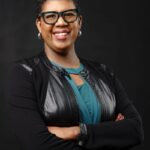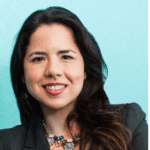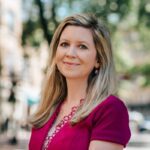
Editor’s Note: For Women’s History Month, we asked female communicators, during a virtual roundtable, about advancing in their PR careers, starting their own agencies and how the last few years of more flexible work have shifted the paradigm.
Our guests included: Bernadette Adams Davis, founder, Bernadette Davis Communications; Talia Beckett Davis, founder, Women in PR North America; and Melissa Vela-Williamson, founder, MVW Communications.
This conversation was edited for length and clarity.
PRNEWS: As we approach Women’s History Month, tell us about how you have experienced the evolution of DEI, particularly as it pertains to gender, over your careers.

Bernadette Adams Davis: More people in general, not just PR professionals, are carrying the power of production in their hands…I think one of the ways PR is changing, from a gender perspective, is that it is easier now than 20, 30 years ago to start an agency…So people…work to create opportunities for themselves that they might not have had in a larger organization.
Of course, flexibility has a big impact…whether it's caregiving for a partner, an older parent, or relative or children, or even just taking care of yourself, that ability to have flexibility is huge for all of us at different points in our lives…

Melissa Vela-Williamson: As I advanced in PR, the further up I went on that career ladder, the further down my family seemed to be. The big catalyst for me starting my own firm was that all our typical jobs and the industry were downtown…I just logistically couldn't make it in time to get my kids from school. And it wasn't okay for a PR supervisor to run out the door at 5 p.m. It's just culturally not… So when you ask about women, and particularly mothers, unable to advance, the guidance from me is start your own business…Because sometimes it's the only way you can really shape the career that you want…
PRNEWS: How would you advise communicators who are in-house or at a larger agency to work to develop and evolve this sort of flexibility and gender equality?
Adams Davis: I think it's being that voice who brings the topic up…part of the evolution was that DEI was always kind of set to the side…Same thing with thinking about gender and even accessibility. It's not something separate.
If your team is working on a plan for the annual agency party, or a change in benefits, or how we change a process for our meetings and our client meetings, there is probably an inclusion or an accessibility component…How can you bring those topics up and be an advocate for that? That's another part of what we've seen during the pandemic; people have more access, in some ways, because they could work from home or join something virtually…
Be the person who thinks about [accessibility], not just when a challenge or problem comes up, or someone externally brings it up. It should be a part of your day-to-day. How do we think about the way that we work?
Vela-Williamson:…A key element for women to advance in their careers is [for them] to really demand what they need.
…You have to recognize your own worth and make that confident ask…asking more men to chime in, and ask for that flexibility, and ask for accessibility…There's always a way to find a middle ground. But take the time to ask for it. Compromise is what gets left behind sometimes in our rush to succeed and run the businesses.

Talia Beckett Davis: Before I became a mom, I had all these ambitions of trying to climb the corporate ladder…And then I reevaluated what's important to me. Now, I prioritize my family time over my work time, and for me, that meant starting my own business.
There was a huge moment for me when I returned from maternity leave to my communications role, which had been turned into a part-time position. I worked with all men, and they just felt that I was too busy as a new mom to take on all this responsibility, so they made that decision for me…I had worked so hard to get promoted into that role, only to have everything pulled out from under me. Then a male colleague left his position as a VP, and I applied for it…I could actually hear [the male leaders in the company] laughing about the fact that I had applied for this position. The message was, she doesn't have time to take on this responsibility…Since that moment, I've been really trying to work to remove a lot of those roadblocks for women in the industry.
PRNEWS: You all started your own agency because of situations in which you felt that, because you're a woman, because you're a mother, you couldn't advance. What is stopping all women from going out on their own? How can companies show that there are opportunities for advancement? Have you seen any shifts in the industry that have helped women advance into leadership roles?
Beckett Davis: When people look at leadership, they want to see themselves in that future role. So if there aren’t working mothers that are in senior leadership positions, or maybe it's someone that's all about the hustle culture…that's not something I cannot relate to. That's an office environment that I do not want to be part of. So I think it really has to come from the top-down leadership for us to be able to see ourselves in those roles.
Vela-Williamson: It's definitely representation…People relate to people like them, whatever that experience is. And I think what stops women from jumping off and starting their own businesses…or advancing, is fear…fear of not doing it right, fear of having to self-promote, fear of not having the support of family...
If you're in-house, don't let fear stop you…know your worth…A lot of female pros hold themselves back because they don't want to go for that next job or higher job because [they fear] they'll get laughed at because they’re a mom or because they'll get discriminated against…or because they won't have the flexibility to be the primary caregiver…
Adams Davis:…There is a narrative around being an entrepreneur, that sometimes makes it seem too lofty for you to achieve. And we need to talk more about what it takes and what it doesn't take.
…If you're in-house, I think one of the biggest barriers, even beyond the competence and fear that people may have, is that leaders and organizations really need to look at where they see that platform for their company. If you have any diverse employee populations, at what point does that begin to thin out?...That's where the work is.
The organization needs to do that work. They need to determine, why is it that people of color are not applying for these roles? Or why is it they're applying, but we don't ever hire them into or promote them into these roles?
And what are we doing as an organization to say…in order to get to these roles, here are the requirements in the job listing. But we also are really looking for people who have done XYZ, and then going to people who are interested and saying, ‘I think this can be your path; here is what you need to do.’ A lot of times those things are unspoken. And you don't know, when you're applying, that they're also looking for this one quality they haven't talked about…they need to be explicit about that. Because I don't think that burden needs to sit on the employee who's trying to move forward. Someone needs to make clear what that path is and what that playbook is.
Vela-Williamson: That also means…taking that time to mentor a female that has that potential and saying, ‘here's what I did; here's how you can shore up your qualifications,’ and being supportive and encouraging them to pursue it.
PRNEWS: We haven’t really touched on mentorship. What can men do not just to be allies, but to understand how to support women in the workplace?
Adams Davis: They need to be thoughtful and look at how they work and how their networks work. A lot of those [hiring and promotion] decisions are made within a certain circle. So people are pulling in people they know, people who know someone they know. And if your circle is not diverse, then that's not ever going to change. So [men] need to be intentional about increasing who is in their circle, and really engaging with people beyond who they normally think of...They need to open up their circles and become sponsors, more than mentors, for women, for people of color.
Vela-Williamson: We have to normalize that men and women in the workplace can support each other, have lunch together, have the coffee meetings, share information, without it having to be associated with a romantic relationship…
Beckett Davis: If you want to attract diverse talent to your organization, then your senior leadership cannot be all men, because women are not going to apply…I don't want to have to answer to a compensation committee of all men who feel that this is my value, as a female in the workplace.
Also, from a PR perspective, if it's my job to promote your company, and get you those thought leadership interviews, and then you're not trying to attract more women to the workplace, then that job almost becomes impossible, because the culture really is in the whole DNA of the company. And if I can't promote you and your true values, then it's impossible to do my job effectively.
